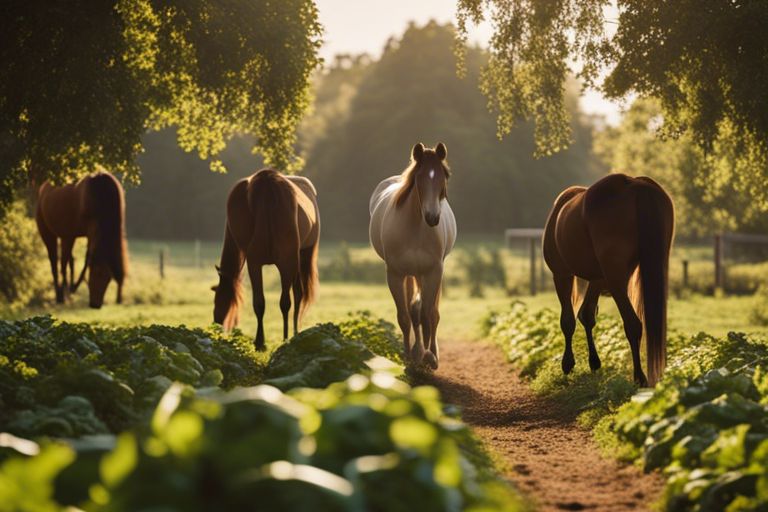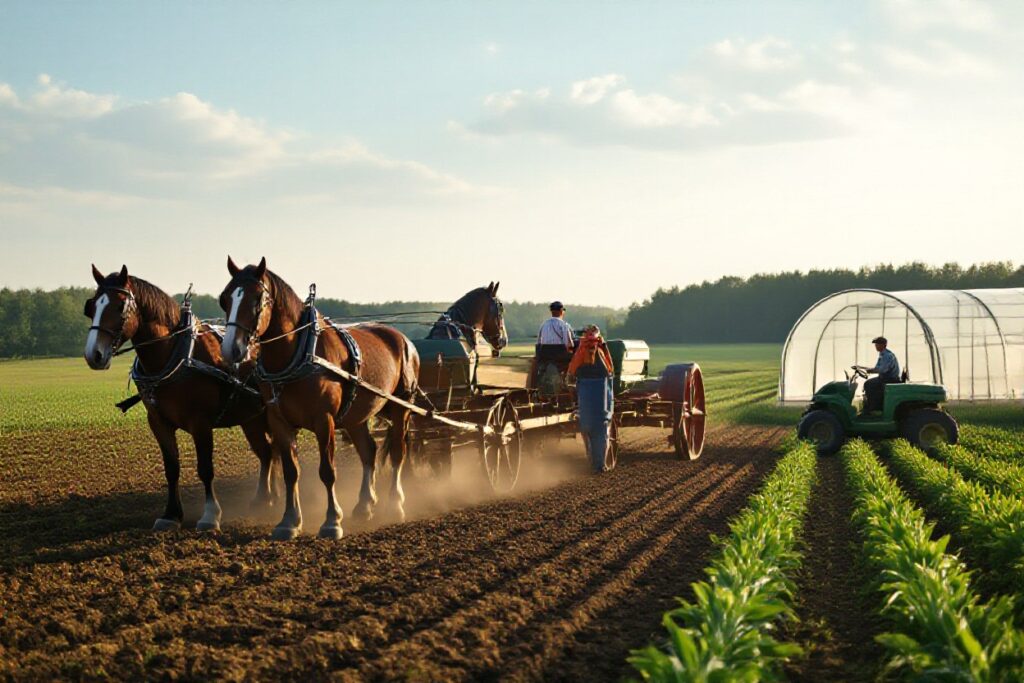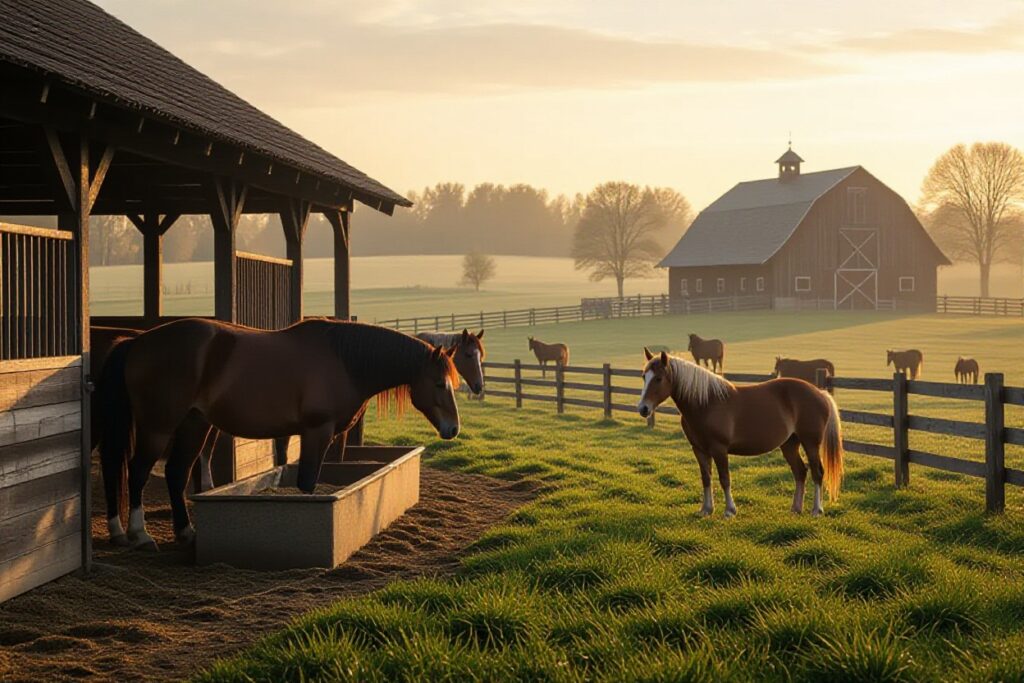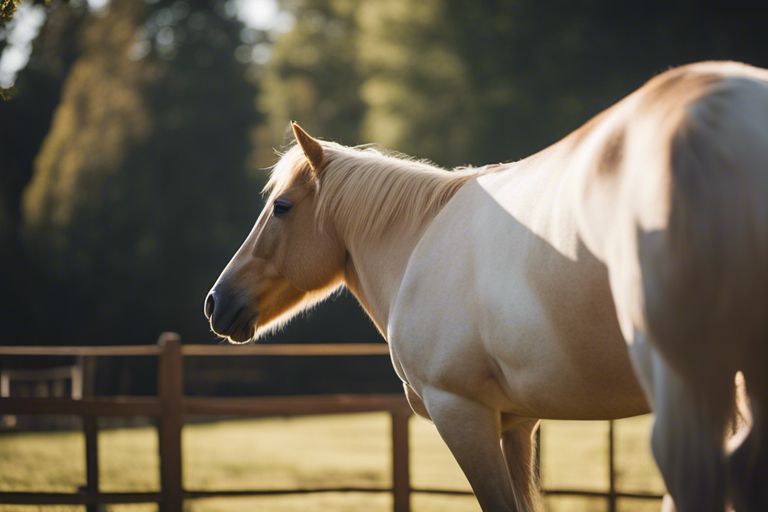There’s a natural grace and power in integrating horses into your farming practices that goes beyond just plowing fields. By bringing these majestic animals onto your farm, you are not only tapping into a more sustainable way of working the land but also fostering a deeper connection to nature and the rhythm of rural life. In this blog post, we’ll explore the benefits of incorporating horses into your farming system and provide you with practical tips on how to successfully integrate them into your sustainable farming practices.
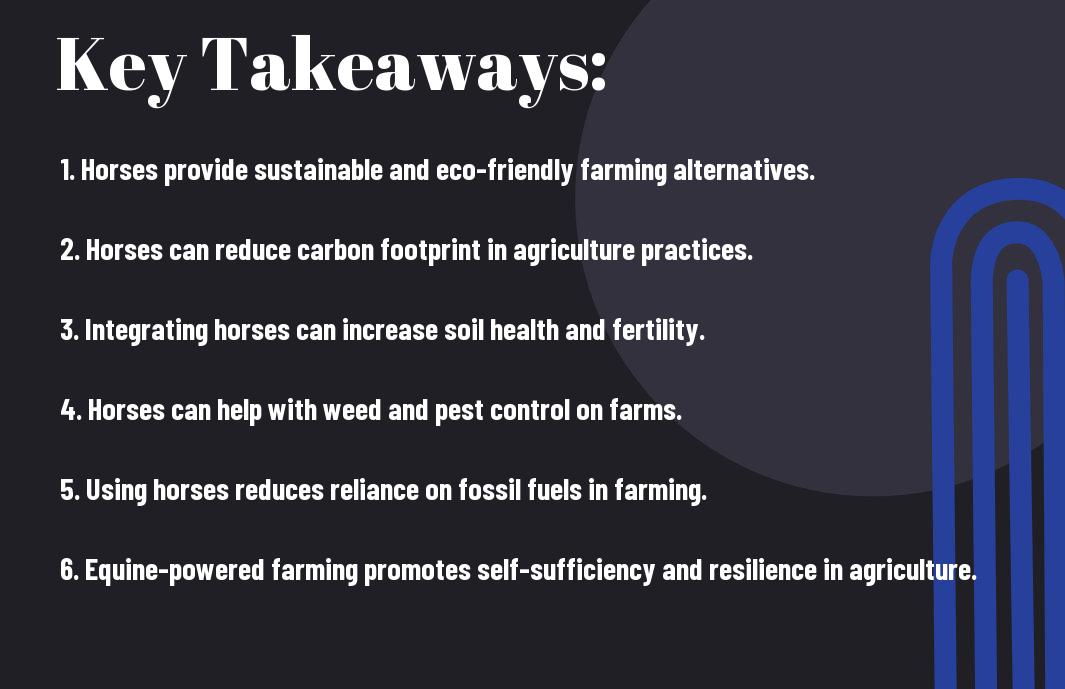
Benefits of Integrating Horses into Sustainable Farming
Environmental Advantages
Sustainable farming practices that integrate horses offer a multitude of environmental benefits. One key advantage is their minimal environmental impact compared to machinery. Horses have significantly lower carbon emissions, reduced soil compaction, and a lighter overall touch on the land. Their hoof action is gentle, preserving soil structure and promoting healthy soil microbiology. By using horses in farming, you can decrease reliance on fossil fuels and reduce the environmental footprint of your operations.
Economic Benefits
On the economic front, integrating horses into your farming system can lead to significant cost savings. While initial investments in equipment and training may be required, in the long run, horses are more cost-effective to maintain than heavy machinery. Horses can be fed on pasture, reducing the need for expensive fossil fuels and machinery maintenance. Additionally, they offer versatility in various tasks on the farm, from plowing fields to pulling logs, providing a one-time investment solution for multiple needs.
Environmental sustainability and economic viability go hand in hand when integrating horses into your farming practices. By reducing your reliance on fossil fuels and heavy machinery, you not only lower your operational costs but also contribute to a healthier environment. The utilization of horses fosters a more balanced and regenerative farming system that benefits both your farm’s productivity and the surrounding ecosystem.
Choosing the Right Horse Breed for Your Farm
If you’re considering integrating horses into your sustainable farming system, choosing the right breed is crucial. Horses can play a valuable role in your farm, assisting with tasks such as plowing, cultivating, and transportation. When opting for a horse breed, there are several factors to consider to ensure that they are well-suited to your farm’s specific needs.
Considerations for Climate and Terrain
Horses, like any other livestock, are affected by the climate and terrain of your farm. It is important to choose a breed that is well-adapted to your specific environmental conditions. For example, some breeds are better suited for cooler climates with heavy workloads, while others thrive in warmer climates with lighter work requirements. Consider the type of terrain on your farm as well; if you have hilly or rocky areas, a sturdy and sure-footed breed would be more suitable.
Selecting Breeds for Specific Tasks
On top of considering climate and terrain, you should also select horse breeds based on the specific tasks you intend for them to perform on your farm. Some breeds are known for their strength and ability to pull heavy loads, making them ideal for plowing and other strenuous tasks. Others excel in agility and speed, which can be beneficial for activities like herding livestock or competing in riding sports. By matching the horse breed to the tasks at hand, you can optimize their performance and productivity on your farm.
Understanding the unique characteristics and strengths of different horse breeds will help you make an informed decision when choosing the right horses for your sustainable farming system. Whether you need them for heavy farm work or light-duty tasks, there is a breed out there that will fit perfectly into your farm’s ecosystem.
Designing a Horse-Friendly Farm Layout
Keep your horses happy and healthy by designing a farm layout that is horse-friendly. This involves careful planning to ensure that your farm provides a safe and comfortable environment for your equine friends. From pasture management and rotation to fencing and corral systems, every aspect of your farm layout plays a crucial role in the well-being of your horses.
Pasture Management and Rotation
Horse-Friendly pasture management is important for maintaining healthy grazing areas for your horses. Rotating pastures regularly can help prevent overgrazing and ensure that your horses have access to fresh, nutritious grass. Dividing your pastures into smaller paddocks and implementing rotational grazing can also help improve soil health and reduce the risk of parasite infestations.
Fencing and Corral Systems
To keep your horses safe and secure, it is crucial to design strong and sturdy fencing and corral systems. Choosing the right materials, such as wooden or vinyl fencing, can help prevent injuries and escapes. Additionally, incorporating electric fencing in high-traffic areas can provide an extra layer of security. Properly maintained fencing and well-designed corrals can help minimize stress and keep your horses contained.
Farm gates should be easily accessible and wide enough for farm machinery to pass through. Make sure to regularly inspect your fencing for any signs of wear and tear and promptly repair any damaged areas to prevent accidents or injuries to your horses. By investing in quality fencing and corral systems, you are creating a safe and reliable environment for your horses to thrive on your sustainable farm.
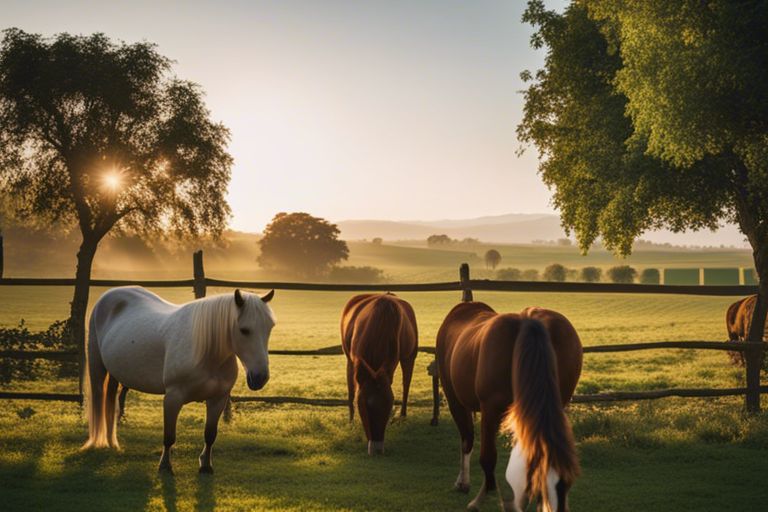
Feeding and Nutritional Strategies for Horses
Now let’s examine the feeding and nutritional strategies to keep your horses healthy and thriving on your sustainable farm.
Hay and Grain Options
Strategies for feeding your horses include providing a balanced diet of hay and grain. Hay is a crucial component of a horse’s diet, providing crucial fiber and nutrients. Look for high-quality hay that is free from mold and dust to prevent respiratory issues. Additionally, incorporating grain into your horse’s diet can help supplement their nutritional needs, but be cautious not to overfeed grain as it can lead to digestive problems.
Pasture Management for Optimal Nutrition
On your sustainable farm, pasture management is key to ensuring your horses have access to nutritious grazing. Rotate pastures regularly to prevent overgrazing and allow for regrowth of grass. Consider planting a variety of grasses and legumes in your pastures to provide a diverse range of nutrients for your horses. Monitoring the condition of the pastures and adjusting stocking rates can help maintain optimal nutrition for your horses.
Grain: Keep in mind that pasture not only provides crucial nutrition for your horses but also allows them to exhibit natural grazing behaviors, promoting both physical and mental well-being. Implementing sustainable pasture management practices not only benefits your horses’ health but also contributes to the overall sustainability of your farm.
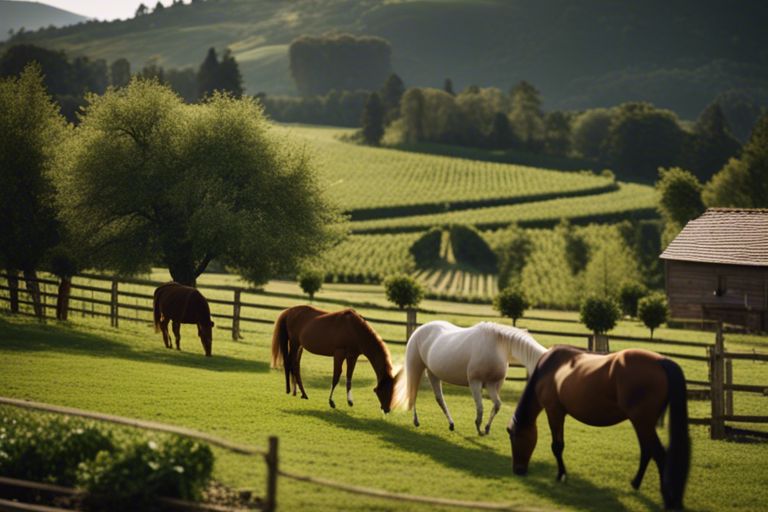
Training and Handling Horses for Farm Work
After selecting the right breeds and integrating horses into your sustainable farming system, the next step is to train and handle them effectively for farm work. This crucial aspect ensures that your horses are not only productive but also safe and well-cared for on your farm.
Basic Training Principles
Horses, like any other farm animal, require training to understand basic commands and develop good behavior for farm work. Here are some necessary principles to keep in mind:
- Consistency: Ensure you are consistent in your commands and expectations to avoid confusion.
- Patience: Training takes time, so be patient and understanding with your horses as they learn.
- Reward-Based Training: Use positive reinforcement such as treats or praise to encourage desired behavior.
Advanced Training for Specific Tasks
When your horses have mastered the basics, you can move on to advanced training for specific tasks on your farm. Whether it’s plowing fields, pulling carts, or transporting goods, advanced training can make your horses even more efficient partners in your farming endeavors.
| Farm Task | Training Techniques |
| Plowing Fields | Teach horses to respond to voice commands and guide them in straight lines for efficient plowing. |
| Transporting Goods | Train horses to pull and stop carts safely, focusing on proper harnessing and load balance. |
- Training: Advanced training requires more specialized techniques and equipment, so make sure you have the necessary tools and knowledge to train your horses effectively for specific farm tasks.
- Importance: Proper training not only improves your horses’ performance but also ensures their safety and well-being while working on the farm.
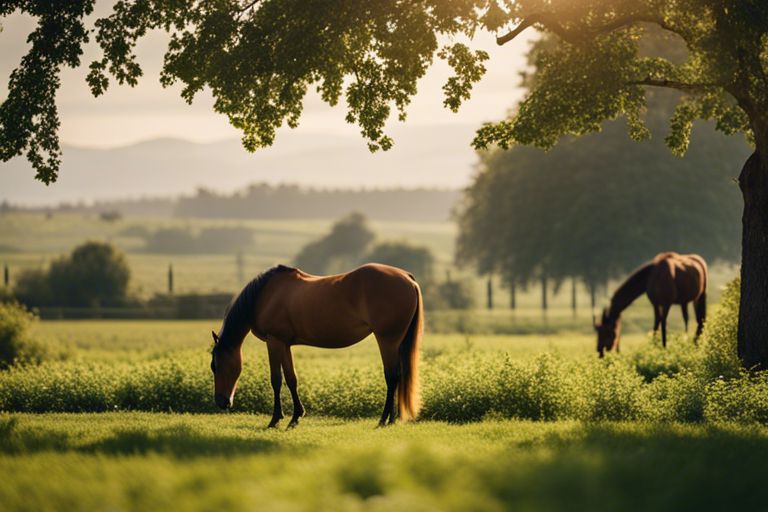
Managing Horse Health and Wellness
Vaccination and Parasite Control
For ensuring the health and well-being of your horses on the farm, consistent vaccination and parasite control are vital. Consulting with your veterinarian to create a tailored vaccination schedule based on your horse’s age, lifestyle, and exposure risks is key. Common vaccines include those for tetanus, rabies, Eastern and Western encephalitis, and influenza. These vaccinations help protect your horses from serious illnesses and diseases that can be detrimental to their health.
Hoof Care and Regular Maintenance
With regular hoof care and maintenance, you can keep your horses healthy and comfortable. This includes regular trimming and balancing of hooves, as well as checking for any signs of cracks, abscesses, or thrush. Proper hoof care is vital to prevent lameness and discomfort in your horses, allowing them to move freely and comfortably across the farm.
Wellness: Scheduling routine appointments with a professional farrier can help ensure that your horse’s hooves are in optimal condition. Your farrier can provide guidance on the appropriate trimming schedule and offer insights into any potential issues with your horse’s hooves. Additionally, providing your horses with a clean and dry living environment can contribute to their hoof health.
Health: Neglecting hoof care can lead to serious issues such as laminitis, which can be painful and debilitating for horses. By prioritizing regular hoof care and maintenance, you are taking proactive steps to promote the overall health and well-being of your horses on the farm.
Summing up
On the whole, integrating horses into a sustainable farming system can provide numerous benefits for both the environment and the farm itself. By utilizing horses for tasks such as plowing, cultivating, and transporting goods on the farm, you can reduce the need for fossil fuels and minimize the environmental impact of traditional farming practices. Additionally, incorporating horses into your farm can create a more harmonious relationship between humans, animals, and the land, promoting a sense of stewardship and connection to the earth.
Q: Why is it beneficial to integrate horses into a sustainable farming system?
A: Integrating horses into a sustainable farming system can provide several benefits. Horses can help with tasks such as plowing fields, spreading manure, and pulling carts, reducing the need for fossil fuel-powered machinery. They can also contribute to soil health through their manure, and their presence can help diversify farm operations.
Q: How can horses help with soil health in a farming system?
A: Horses can contribute to soil health in a farming system in several ways. Their manure is a valuable source of organic matter and nutrients that can improve soil structure and fertility. Additionally, the hooves of horses can help aerate the soil, promoting better water infiltration and root growth.
Q: What are some considerations to keep in mind when integrating horses into a sustainable farming system?
A: When integrating horses into a sustainable farming system, it is important to consider factors such as the nutritional needs of the horses, their housing and pasture requirements, their impact on soil compaction, and their integration with other farm animals. Proper management practices, such as rotating pastures and managing manure, are crucial for a successful integration.
Q: How can horses help with weed control in a farming system?
A: Horses can help with weed control in a farming system by grazing on weeds and minimizing their growth. By incorporating horses into a rotational grazing system, where they are moved regularly to different pasture areas, they can help suppress weed populations and promote the growth of desirable forage species.
Q: What are some tips for successfully integrating horses into a sustainable farming system?
A: Some tips for successfully integrating horses into a sustainable farming system include providing ample access to fresh water and high-quality forage, implementing proper pasture management practices, regularly monitoring the health and well-being of the horses, and seeking guidance from equine and farming experts. It is also important to establish a strong bond and communication with the horses through consistent training and handling.
